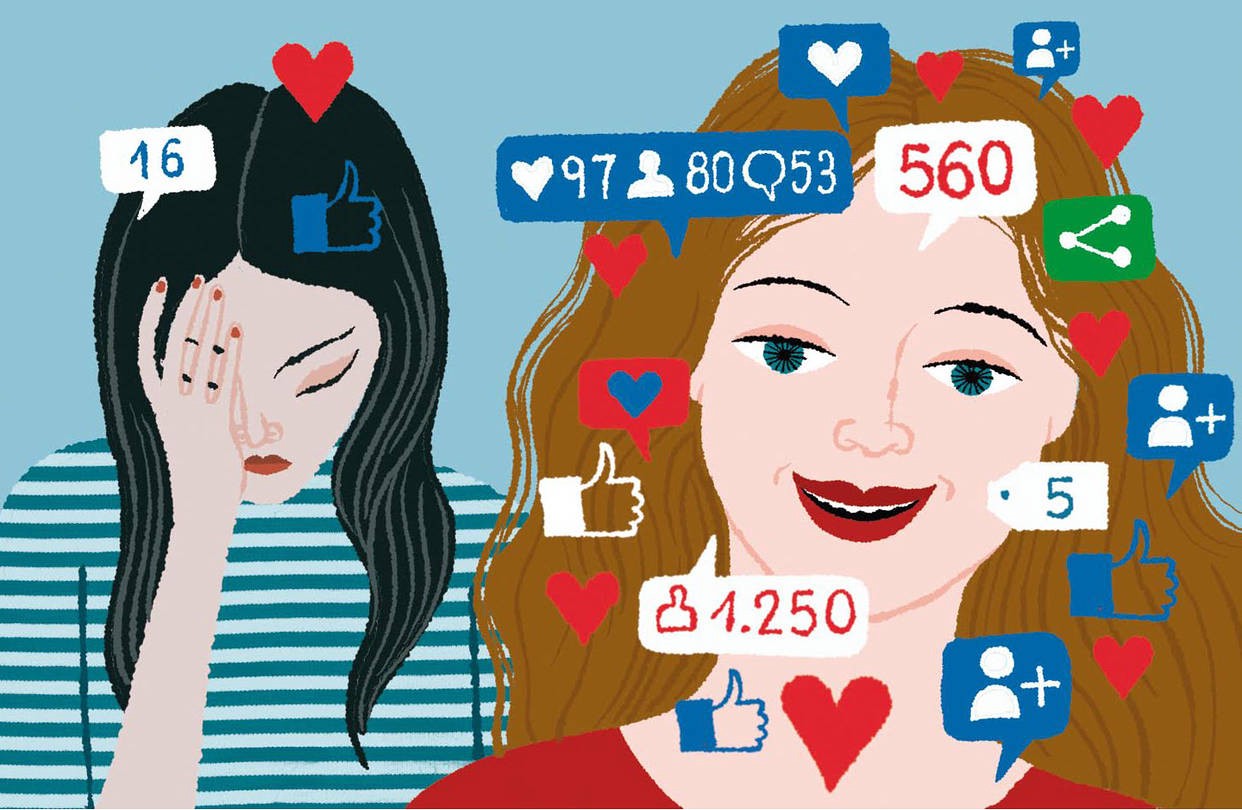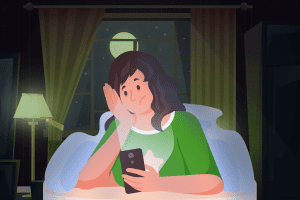Feeling the pressure? How social media is affecting our mental health.

Feeling the pressure? How social media is affecting our mental health.
Table of Contents
ToggleHave you ever been to a gathering and spent 30 minutes just taking photos? Or in a concert and saw everyone holding up their phone? Looking at the concert from a tiny screen instead of living the moment and just feeling the music and taking in the whole experience? These social media profiles are carefully designed in order to portray a perfect life that does not exist.
We don’t live in the moment anymore, we just care about documenting where we’re at and sharing it with our friends and even people we barely know. We care about looking like we’re having fun more than actually having fun. We go to overpriced, crowded places just because they’re “in” right now. We wear certain clothes just because that’s what is “trendy” these days. We might talk, dress and behave in certain ways just to fit in, even if that does not match our personalities or values. Even though living inauthentically will not bring you true happiness, it is completely understandable why we do so. Peer pressure is not only amongst high school kids. Humans naturally want to have a sense of belonging and we want to fit in with a certain crowd. However, we should start asking ourselves: How is this affecting our mental health?
We know that constantly seeing countless weddings on Instagram, your friend’s new job on LinkedIn or your friend’s newly born on Facebook might feel overwhelming and make you feel like you’re way behind. However, you need to remind yourself: Everyone has a different timeline, different priorities, and goals in life. You don’t have to graduate from university before 21. Or have a settled career with a full-time job at 23. Or married at 25. Or even have kids before 30. Everyone is different and we all have our unique, beautiful journeys.
Have you ever seen someone posting about a miscarriage, a divorce, or a job loss? No. That’s because no one likes to publicize their low points in life. What you see on social media is not an accurate reflection of people’s lives. We all have our ups and downs. The downside of social media though is that it doesn’t show you the full picture and it tricks you into believing the illusion that everyone else’s life is perfect. But you’re comparing a low point in your life with the best highlights of another person’s, which isn’t really a fair comparison. They, too, often fail at work, experience breakups and have felt lonely at times.
Social media can also affect our body image. Studies suggest that being aware of a thin ideal, internalizing that thin ideal, and perceived pressures to be thin are all associated with one’s body image. The degree to which a person internalized the pressure to be thin as their beliefs, values, or ideals is what most affects their body image. Also, because we are a collectivist society, meaning that we highly value group needs over individual needs, social harmony, and conformity to roles and norms, we organize our perceptions and behaviors according to the thoughts and feelings of others as fitting into society is viewed as critical.
According to social comparison theory, humans have an inborn drive to evaluate themselves, which is often in comparison to others. This is a way of establishing a benchmark to make an accurate assessment of ourselves. When we compare ourselves to someone we view as superior, this is called upward social comparison. Have you ever caught yourself saying “Why don’t I look like her?” Or watched a story of a wedding and thought to yourself “I’m so behind. I’m still not even in a relationship!” These are examples of upward social comparison, which could be beneficial as they can serve as an inspiration, however, they could also be extremely harmful, causing us to have worse self-perceptions and less self-confidence. According to studies, people are more prone to such negative feelings and consequences from upward social comparisons if they are passive users of social media. This means that they do not engage in direct exchanges with other users and instead just scroll through news feeds and look at other people’s profiles. This is also believed to cause feelings of envy and jealousy. Social media is actually associated with different harmful effects, including:
- Negative signs and symptoms of depression, anxiety, and stress if social media is used for prolonged periods of time.
- Feelings of anxiety, perfectionism, and body negativity are associated with posts, likes, and comments.
- Unrealistic expectations are developed by young adolescents. Expectations related to what they should look like, and what they need to achieve or own, which is associated with high rates of anxiety.
- Worsening of depression, which is linked to feelings of envy and looking down upon oneself due to social media use.
- Decreased overall well-being is associated with heavy users of social media, who also experience a lower sense of self, depression, and suicidal thoughts.
- Poor body image, which is crucial for self-esteem. This is especially dangerous in adolescent years, where negative self-comparison and cyberbullying are common.
- Development of eating disorders. Social media might cause a lot of people to want to change their bodies through disordered eating habits and fad diets such as the tea craze diet and restrictive cleanse, which are promoted by influencers who have the ideal body type.
- Higher depression and anxiety are linked to frequent filter use.
- Low self-esteem and higher anxiety, neuroticism and narcissism are associated with inauthentic self-presentation.
Now that we have a better understanding of how social media is affecting us, it might be a good idea to start taking some proactive steps to decrease those negative effects.
How to lessen the harm of social media:
- Reduce your time online.
This can be done by using an application or your phone’s settings to lock social media applications after a certain amount of time. You could also disable notifications from social media apps to get rid of the temptation to check them frequently.
- Mute or unfollow accounts that always leave you feeling bad about yourself.
- Reflect.
Reflect on your motivation for screen time. Are you a passive or an active user? Are you using social media as a substitute for real life? Could there be a healthier alternative if you’re bored, lonely or feeling down? Also, reflect on how you feel after logging in. Do you feel happy and refreshed? Tired and drained? Or envious and upset? Maybe you should cut down on the behavior that reproduces negative feelings and thoughts. Is it scrolling for an hour before bed? Or is it spending 15 minutes filtering and editing your photo before posting?
- Journaling.
If there is something in particular that you’re envious or jealous of, journal about why it’s important for you and maybe how to reach that goal. This could be an essential moment for introspection and goal-setting.
- Spend time with your offline friends.
Spend time with people who love you and make you feel worthy. Be mindfully present with them, without thinking about anything else.
- Practice mindfulness.
Instead of focusing on the “What ifs” and “Only ifs,” learn to live and be fully engaged in the present moment.
- Gratitude journaling.
Download an app or buy a small notebook and start jotting down a few things you’re grateful for every morning.
- Therapy.
If your feelings are overwhelming and it’s affecting other areas of your life negatively, then consider seeking therapy.
If you want to know more about the effects of social media and how to deal with it, check out this podcast: 3alShezlong
References:
- Hye-Ryeon Lee , Hye Eun Lee , Jounghwa Choi , Jang Hyun Kim & Hae Lin Han (2014): Social Media Use, Body Image, and Psychological Well-Being: A Cross-Cultural Comparison of Korea and the United States, Journal of Health Communication: International Perspectives, DOI: 10.1080/10810730.2014.904022
- https://www.pennmedicine.org/news/news-blog/2019/november/dis-like-how-social-media-feeds-into-perfectionism
- Robinson, L. (2022, June 15). Social Media and Mental Health. HelpGuide.org. Retrieved June 28, 2022, from https://www.helpguide.org/articles/mental-health/social-media-and-mental-health.htm
- Appel, Helmut & Gerlach, Alexander & Crusius, Jan. (2016). The interplay between Facebook use, social comparison, envy, and depression. Current Opinion in Psychology. 9. 44-49. 10.1016/j.copsyc.2015.10.006.
- Twenge JM, Campbell WK. Media Use Is Linked to Lower Psychological Well-Being: Evidence from Three Datasets. Psychiatr Q. 2019 Jun;90(2):311-331. doi: 10.1007/s11126-019-09630-7. PMID: 30859387.
- Verduyn, P., Gugushvili, N., Massar, K., Täht, K., & Kross, E. (2020, April 14). Social comparison on social networking sites. Current Opinion in Psychology. Retrieved June 23, 2022, from https://www.sciencedirect.com/science/article/pii/S2352250X20300464
- Ojha, Kartikeya; Soohinda, Geeta1,; Sampath, Harshavardhan1; Dutta, Sanjiba1 Social networking sites and its relation to social comparison and psychological well-being among medical university students, Indian Journal of Psychiatry: Nov–Dec 2021 – Volume 63 – Issue 6 – p 593-596
- doi: 10.4103/indianjpsychiatry.indianjpsychiatry_1344_2
- Santarossa, S., & Woodruff, S. J. (2017). #SocialMedia: Exploring the Relationship of Social Networking Sites on Body Image, Self-Esteem, and Eating Disorders. Social Media + Society. https://doi.org/10.1177/2056305117704407
- Cherry, K. (2020, September 20). How social comparison theory influences our views on ourselves. Verywell Mind. Retrieved June 26, 2022, from https://www.verywellmind.com/what-is-the-social-comparison-process-2795872#:~:text=People%20compare%20themselves%20to%20those,to%20feel%20better%20about%20themselves.






